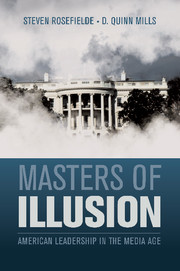Book contents
- Frontmatter
- Contents
- List of Tables and Figures
- Preface
- Acronyms
- Executive Summary
- Acknowledgments
- PART I NATIONAL SECURITY IN THE NEW AGE
- PART II AMERICAN PUBLIC CULTURE AND THE WORLD
- 3 “Smooth Comforts False” – The Illusions That Confuse Us
- 4 Towers of Illusion: Dysfunctional Behaviors
- 5 Mythomaniacs: The Sources of Our Illusions
- PART III AMERICAN PUBLIC CULTURE AND OURSELVES
- PART IV THE RECONFIGURATION OF NATIONAL WEALTH AND POWER
- PART V VORTEXES OF DANGER
- PART VI THE AMERICAN RESPONSE
- PART VII LEADING TOWARD PEACE
- PART VIII AMERICAN PRESIDENTIAL LEADERSHIP
- Notes
- Glossary
- Bibliography
- Index
3 - “Smooth Comforts False” – The Illusions That Confuse Us
Published online by Cambridge University Press: 31 July 2009
- Frontmatter
- Contents
- List of Tables and Figures
- Preface
- Acronyms
- Executive Summary
- Acknowledgments
- PART I NATIONAL SECURITY IN THE NEW AGE
- PART II AMERICAN PUBLIC CULTURE AND THE WORLD
- 3 “Smooth Comforts False” – The Illusions That Confuse Us
- 4 Towers of Illusion: Dysfunctional Behaviors
- 5 Mythomaniacs: The Sources of Our Illusions
- PART III AMERICAN PUBLIC CULTURE AND OURSELVES
- PART IV THE RECONFIGURATION OF NATIONAL WEALTH AND POWER
- PART V VORTEXES OF DANGER
- PART VI THE AMERICAN RESPONSE
- PART VII LEADING TOWARD PEACE
- PART VIII AMERICAN PRESIDENTIAL LEADERSHIP
- Notes
- Glossary
- Bibliography
- Index
Summary
Smooth comforts false, worse than true wrongs.
Shakespeare, Henry IV, Part II, lines 39–40We have become accustomed to preconceiving world events. The public culture of a country expresses these preconceptions, and many of us accept them uncritically and are strongly committed to them. Convictions planted in us by our public culture are nearly unshakable because they are reinforced continually. Shakespeare got it right in Henry IV when he wrote “smooth comforts false, worse than wrongs” – in part because we recognize wrongs for what they are and try to right them; but smooth comforts that are false, the illusions of public culture, are not recognized as wrong and we do not erect defenses against them or try to correct them.
“Man's general way of behaving,” Maimonides wrote, “is to be influenced by his neighbors and friends – letting his customs be like the customs of the people of the country.”
America has a very distinct public culture – a set of “socially” approved ideas about what the world ought to be. These ‘idols,’ as Francis Bacon observed centuries, ago garble public discourse by confusing us as to what is reality and by tempting us to try to make the world like we wish it were.
Every nation has its own “self-evident” values, a popular culture that shapes approved attitudes and establishes rules of permissible partisan debate. The benefits of consensus in a world roiled by contentious private interests, the elusiveness of truth, and ethical ambiguities make some common ground imperative.
- Type
- Chapter
- Information
- Masters of IllusionAmerican Leadership in the Media Age, pp. 37 - 62Publisher: Cambridge University PressPrint publication year: 2006

